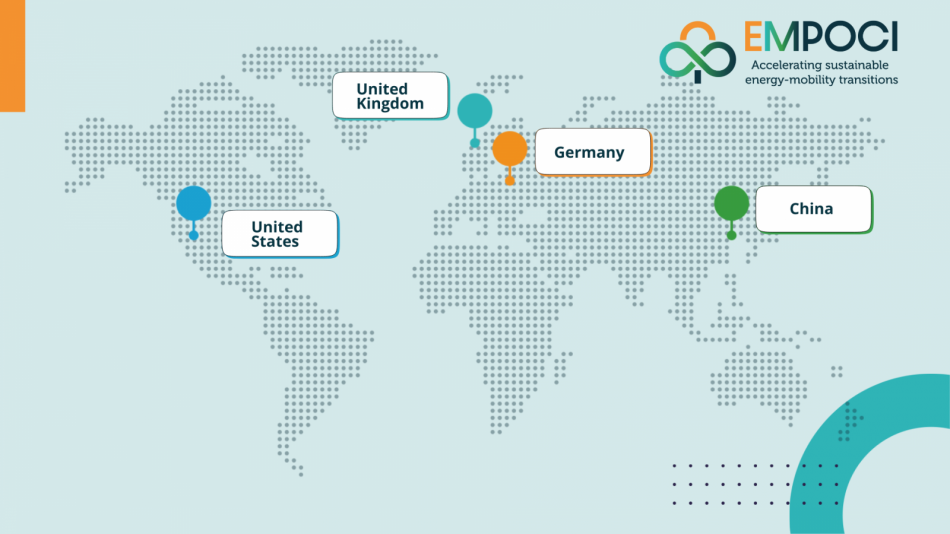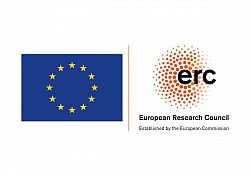EMPOCI: Accelerating sustainable energy-mobility transitions
Here's everything you need to know about the EMPOCI project.
 What we are doing
What we are doing
The EMPOCI project, led by Professor Karoline Rogge , explores how to accelerate the low-carbon transition in our interconnected energy and mobility systems.
The project focuses on four countries: the UK, Germany, the USA, and China. It investigates the governance implications of the ways businesses, policymakers, society and academia are accelerating net-zero transitions in those places. In particular, it focusses on how to balance competing climate policy interests and industrial policy concerns.
For updates and further information, follow us on LinkedIn .

 Our Objectives
Our Objectives
There are three things we want to accomplish by the end of the project.
1. Understanding Co-Evolution of Policy and Innovation. EMPOCI aims to investigate how multi-level policy mixes interact with low-carbon innovations in socio-technical transitions. How do different policy mixes affect innovation? How do novel low-carbon solutions shape policy thinking? And what is the influence of the global interplay in the low-carbon energy-mobility transition?
2. Developing New Tools. We aim to create and apply new methodological tools that can provide broad and deep insights into the main drivers and barriers for accelerating low-carbon transitions. Examples include novel actor mapping and multi-actor acceleration surveys.
3. Co-Designing Practical Strategies: EMPOCI will collaborate with stakeholders to co-design actionable strategies to support fast, deep and just low-carbon energy-mobility transitions in a politically charged context.
 Our Research Methods
Our Research Methods
EMPOCI employs a multi-method research design combining qualitative and quantitative methods to investigate the governance of sustainable energy-mobility transitions.
This includes:
- Multi-actor case studies and surveys
- Transformative foresight processes
- Data analytics of policies, agency and innovation dynamics
EMPOCI will analyse the innovation-led decarbonisation of the increasingly interconnected electricity-mobility-ICT sectors in two European countries (UK, Germany), and two countries outside Europe (China, USA).
 Study on transformation of the UK automotive industry
Study on transformation of the UK automotive industry
The challenges facing the UK automotive industry as it transitions to electric mobility are not only occupying industry leaders, policymakers and the media, but are also the focus of academic research. The University of Sussex is currently conducting a study on the strategic responses of automotive manufacturers and suppliers in the global innovation race, and has commissioned OMB Research to carry out the survey. Based on the strictly confidential and aggregated results, we derive strategic implications and policy recommendations for companies, government and other stakeholders aimed at safeguarding competitiveness in a zero-emissions future.
Taking part in the study offers benefits for participating companies, including:
- contributing your perspective to the further development of industrial and climate policy frameworks
- receiving a concise results report on the transformation activities of the UK automotive industry.
- benchmarking your position against current assessments across the value chain.
Further information on our academic study can be found in our concise EMPOCI flyer [PDF 185.71KB].
Additional details are available in our Information sheet [PDF 203.75KB] and our Data protection sheet [PDF 187.89KB].
 Studie zur Transformation der deutschen Automobilindustrie
Studie zur Transformation der deutschen Automobilindustrie
Die Herausforderungen, vor denen die deutsche Automobilindustrie durch den Wandel zur Elektromobilität steht, beschäftigen nicht nur die Industrie, Politik und Medien, sondern auch die Forschung. Die Universität Sussex in Kooperation mit dem Fraunhofer-Institut für System- und Innovationsforschung führt aktuell eine Studie zu den strategischen Reaktionen von Herstellern und Zulieferern im globalen Innovationswettlauf durch, und hat hierzu das SOKO Institut in Bielefeld mit der Durchführung beauftragt. Auf Basis der selbstverständlich vertraulichen und aggregierten Ergebnisse leiten wir strategische und politische Handlungsempfehlungen für Unternehmen, Politik und weitere Stakeholder zur Sicherung der Wettbewerbsfähigkeit in einer emissionsfreien Zukunft ab.
Die Studienteilnahme hat folgenden Nutzen für teilnehmende Unternehmen:
- Bringen Sie Ihre Perspektive in die Weiterentwicklung der industrie- und klimapolitischen Rahmenbedingungen ein.
- Erhalten Sie einen kompakten Ergebnisbericht über die Transformationsaktivitäten der deutschen Automobilindustrie.
- Vergleichen Sie Ihre Position anhand aktueller Einschätzungen entlang der Wertschöpfungskette.
Weitere Informationen zu unserer wissenschaftlichen Studie finden Sie in unserem kompakten Flyer. Noch mehr Infos finden Sie in unserem Informationsblatt zur Studie und zum Datenschutz
Die Befragung wurde abgeschlossen und wir arbeiten mit Hochdruck an der Auswertung der Daten. Wir bedanken uns ganz herzlich bei allen teilnehmenden Unternehmen für die Unterstützung unserer Forschung! Folgen Sie uns auf LinkedIn, um aktuelle Informationen über unsere Ergebnisse zu erhalten.
 Engagement & Impact
Engagement & Impact
The EMPOCI team shares its findings through academic and non-academic publications, workshops, and social media.
We regularly present our research at conferences and seminars, and engage with stakeholders through transformative foresight workshops in the UK and Germany.
Follow us on LinkedIn for news and updates about our work.
Policy Briefs
How phase-out policies strengthen Europe’s automotive industry
DOI: https://zenodo.org/records/18347991
How phase-out policies strengthen Europe's automotive industry (German translation)
 Our Publications
Our Publications
Call for Abstracts: Special issue in Research Policy on "Accelerating Net-zero Transitions"
Here are some of our recent publications:
- Institutional barriers to dynamic truck charging: why electric road systems struggle in Europe, by Aline Scherrer, Matthew Lockwood, Uta Burghard, and Karoline Rogge (2026)
- Towards a Community Acceleration Survey for Europe’s automotive industry, by Karoline Rogge (2025)
- Regulatory state capacity for accelerating net-zero transitions: Lessons learned from governing electricity storage in Germany, by Andrea Käsbohrer, Karoline Rogge, and Hans-Martin Zademach (2025)
- When do incumbents adopt radical net-zero technologies? Analysing differences in strategy trajectories of European truck manufacturers towards alternative vehicle technologies, by Aline Scherrer and Karoline Rogge (2025)
- Coordinating the energy transition: Electrifying transportation in California and Germany, by Nicholas Goedeking and Jonas Meckling (2024)
- Governance in multi-system transitions: A new methodological approach for actor involvement in policy making processes, by Asli Ates, Karoline Rogge, and Katherine Lovell (2024)
- Challenges in accelerating net-zero transitions: insights from transport electrification in Germany and California by Karoline Rogge and Nicholas Goedeking (2024)
- Mapping the governing entities and their interactions in designing policy mixes for sustainability transitions: The case of electric vehicles in China by Qi Song, Karoline Rogge and Adrian Ely (2023)
- Policy mixes for addressing environmental challenges by Karoline Rogge and Qi Song (2023)
More publications can be found in our Zenodo community.
 Our Team
Our Team
 Further Information
Further Information
EMPOCI collaborates with international experts, including Prof Yuan Zhou at Tsinghua University and Prof Jonas Meckling at UC Berkeley.
The German case study benefits from Prof Karoline Rogge’s second affiliation with Fraunhofer ISI.
EMPOCI is funded by the European Research Council (grant agreement no. 85273).
